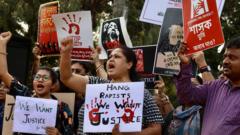A Kolkata court has found Sanjay Roy guilty of the heinous rape and murder of a trainee doctor, a crime that has sent waves of fury and demands for justice across India. The 31-year-old woman's lifeless body was discovered on August 9, 2024, following a grueling 36-hour shift at RG Kar Medical College and Hospital, where Roy allegedly attacked her. The incident has spotlighted systemic issues surrounding the safety of healthcare workers, particularly women, leading to massive public outrage and protests throughout the nation.
Man Convicted in Shocking Murder of Trainee Doctor in Kolkata

Man Convicted in Shocking Murder of Trainee Doctor in Kolkata
Nationwide protests erupt after the brutal attack on a young medical professional, raising alarms about women's safety in India.
The court's ruling was confirmed by Judge Anirban Das, who is set to announce the sentence on Monday, with penalties potentially ranging from life imprisonment to the death penalty. Despite his guilty verdict, Roy has steadfastly claimed he is innocent and has been unjustly accused.
The victim's mother expressed her deep concern over the legal proceedings, emphasizing that a failure to impose the death penalty would undermine public confidence in the judiciary. The gruesome details emerged through a post-mortem report, revealing that the doctor struggled against her attacker before ultimately succumbing to strangulation.
The crime has ignited widespread demonstrations by medical professionals demanding protective measures and justice. Efforts intensified following the incident, with thousands of women marching in solidarity and calling attention to the rampant violence against healthcare workers. A notable demonstration, "Reclaim the Night," saw women take to the streets in several cities, including Kolkata, coinciding with the eve of India’s Independence Day.
Initial investigations by local police were criticized, leading to the case being handed over to the Central Bureau of Investigation (CBI) due to allegations of mishandling. However, the victim's family remains skeptical of the thoroughness of the inquiry, seeking additional accountability from those potentially involved.
This tragic case has amplified discussions about rising violence against women in India, where more than 31,000 rapes were reported in 2022. Ongoing societal issues, including stigma and mistrust in law enforcement, further contribute to the alarming statistics regarding sexual violence in the country.
Historical parallels are drawn to the 2012 case involving the rape and murder of a medical student in Delhi, which similarly ignited national protests and led to legal reforms. The collective outrage following these incidents highlights the urgent need for systemic change aimed at protecting women and ensuring justice in the face of gender-based violence.
As the nation watches this case unfold, the calls for justice and safety for women in India continue to grow louder.
The victim's mother expressed her deep concern over the legal proceedings, emphasizing that a failure to impose the death penalty would undermine public confidence in the judiciary. The gruesome details emerged through a post-mortem report, revealing that the doctor struggled against her attacker before ultimately succumbing to strangulation.
The crime has ignited widespread demonstrations by medical professionals demanding protective measures and justice. Efforts intensified following the incident, with thousands of women marching in solidarity and calling attention to the rampant violence against healthcare workers. A notable demonstration, "Reclaim the Night," saw women take to the streets in several cities, including Kolkata, coinciding with the eve of India’s Independence Day.
Initial investigations by local police were criticized, leading to the case being handed over to the Central Bureau of Investigation (CBI) due to allegations of mishandling. However, the victim's family remains skeptical of the thoroughness of the inquiry, seeking additional accountability from those potentially involved.
This tragic case has amplified discussions about rising violence against women in India, where more than 31,000 rapes were reported in 2022. Ongoing societal issues, including stigma and mistrust in law enforcement, further contribute to the alarming statistics regarding sexual violence in the country.
Historical parallels are drawn to the 2012 case involving the rape and murder of a medical student in Delhi, which similarly ignited national protests and led to legal reforms. The collective outrage following these incidents highlights the urgent need for systemic change aimed at protecting women and ensuring justice in the face of gender-based violence.
As the nation watches this case unfold, the calls for justice and safety for women in India continue to grow louder.




















